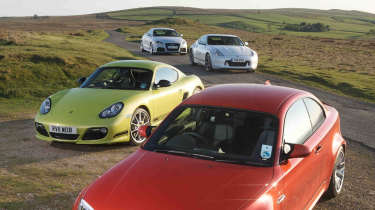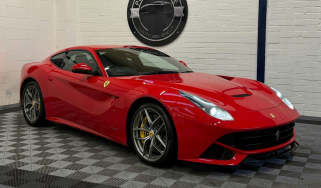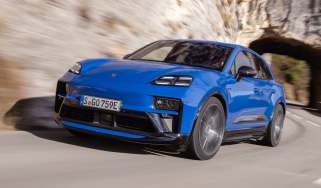BMW 1-series M Coupe v Porsche Cayman R, Audi TT RS, Nissan 370Z
BMW's baby M car, the new 1-series M Coupe, battles tough rivals fron Porsche, Nissan and Audi. Richard Meaden referees on road and track
So this is it, the time we find out whether BMW really has rekindled the old E30 M3 magic with the hotly anticipated 1-series M Coupe.
Waiting to put it through the wringer are three very different yet extremely capable adversaries: the lightweight, ultra-focused mid-engined Porsche Cayman R, the slick and potent all-wheel-drive Audi TT RS, and the honest-to-goodness Nissan 370Z, here being tested in box-fresh GT Edition specification for the very first time.
It’s a compelling, disparate bunch: a quartet of coupes that encompasses normal aspiration and forced induction, front- and mid-engined layouts, rear-wheel drive and all-wheel drive. Amazingly, there’s also a £26,000 difference between the cheapest and most expensive cars in the test: £35,000 as tested for the Nissan versus £61,000 for the Porsche. Throw in the mix of two-seat, 2+2 and full four-seat accommodation and it’s clear the 300bhp-plus coupe sector has all the bases covered.
We converge on north Wales to find blue skies, warm temperatures and blissfully empty roads. I’ve made the 200-mile journey from evo HQ in the £40K BMW, and while the real driving is yet to begin, I’m already hugely encouraged by the new M-car.
It’s a special moment the first time you get your hands on the 1M. It’s a little bruiser of a coupe, clearly based on the slightly gawky 1-series yet endowed with a superhero-style physique. A spangly coat of Mr Universe orange further draws attention to the muscle definition; great for photos, but, er, a challenging shade for real life. On balance, though, the 1M’s look is a big hit with us.
More reviews
Group tests
In-depth reviews
- BMW M135 xDrive review – all-wheel drive hot hatch eyes Audi S3
- BMW 1-series review – Munich’s Audi A3 rival gains focus
Reviews
Plenty of things strike you about the baby M-car. Perhaps the most crucial of these is the fact it feels small. Like properly hot-hatch compact. Given that the current E92 M3 can feel too bulky on give-and-take roads, this downsizing is smart and welcome. The fat steering wheel, stubby gearlever and plumply supportive seats emphasise the 1M’s sporting intent and give it a special air of expensive purpose. It’s easy to get yourself comfortable and you soon feel plugged into the action.
The 335bhp twin-turbo straight-six starts with a pleasing growl and settles into a rumblelicious idle – good news given the fears that blowers would deny this new breed of M-car a memorable voice. The gearshift is short and snickety, the clutch light and smooth to engage. The throttle has a slightly contrived and non-linear feel whether you opt for regular or Sport mode: the former gives you a disproportionately late surge of acceleration towards the end of the throttle travel, the latter an early slug of response. Neither is disastrous, but they could be better.
The 1M doesn’t have switchable dampers to play with, just an MDM (M Dynamic Mode) button to partially or fully disengage the stability/traction control system and an M button on the steering wheel to alter the accelerator response (unlike other M-cars, this button is non-programmable and doesn’t alter any other aspects of the car’s dynamic behaviour). The downside is that the 1M’s damping feels busy and a little muscle-bound at low speed, but the upside is you’re not forever toggling between modes. That said, it quickly becomes apparent that you need to slacken the stability control a notch, because in its default setting the little yellow light flashes more frequently than you might expect on anything but a smooth stretch of road.There’s no doubt this is in part due to the 1M’s impressively potent engine. With an abundance of low and mid-range torque, it really shoves the little coupe down the road. An overboost function provides an extra 37lb ft for limited bursts, lifting peak torque to 369lb ft. That’s serious grunt, especially in something this size, and it makes its presence felt good and early. Make no mistake, this is a quick road car.
Turbos might upset the M purists, and there’s no doubt the twin-turbocharged straight-six doesn’t have the high-rev effervescence of the old E46 M3 motor, nor the banzai top-end rush of the current E92’s V8, but it makes the 1M a consummate overtaker. This muscular immediacy is addictive and enormously impressive, endowing the 1M with big-league pace and a huge margin of safety when dispatching slower traffic.
It’s firmly damped – not harshly so, but truly no-nonsense – reluctant to allow vertical body movement, yet compliant in roll, so you get the impression of the 1M shouldering its way aggressively down the road. It generates oodles of grip at both ends and controls its weight well, so you can really roll up your sleeves and go to work. This makes for busy, physical progress that suits the 1M’s looks and brawny, torque-biased delivery, but at times it leaves you wondering whether the Cayman R would be making more subtle, cerebral progress.
The M differential doesn’t make itself felt when you’re covering ground rapidly, but if the mood takes you to provoke the 1M in tighter corners you need your wits about you, for with so much grip to overcome and that wide-track/short-wheelbase combination, it’s not the most progressive breakaway. That’s the bad news. The good news is that if you’re quick and measured with the corrective lock and committed with the throttle, it does what all good M-cars do: it slides.
The only gripe we have with the 1M is its brakes. No, not because they’re made of Bavarian chocolate – actually they’re very good – but because they are over-assisted. This makes it unnecessarily tricky to apply smooth, progressive braking force, especially in conjunction with heel-and-toe pedal work, but also at low speed when you just want to brush the middle pedal. Yet this is a minor flaw in an otherwise exceptional car. The others will need to be at the top of their game to challenge it.
You don’t need to be Stephen Hawking to deduce that the Cayman R will present a stern challenge. Much has been written about this pared-back Porsche, and while the choice of ‘R’ moniker has riled some (not least evo’s own Monkey Harris), there’s no question that applying the Boxster Spyder weight reduction programme to the Cayman has yielded a car for the true connoisseur.
Our test car is as light as they come. Stripped of air-con and stereo and fitted with PCCB brakes, a six-speed stick-shift gearbox and the smaller, lighter battery, it comes in under 1300kg (the 1M tips the scales at 1570kg). Shame this car’s spec, which also includes the sports exhaust and bi-xenon lights, comes with a heavyweight price tag – a faintly eye-watering £61,402, up from £51,728 basic.
Any lingering doubts that a 325bhp Cayman can be worth that amount of money evaporate in the time it takes you to accelerate through the gears and carve through a series of corners. So many superlatives spring to mind it’s hard to know where to start, but subtlety, poise, progression, cohesion, tactility, balance and exploitability should give you an idea of how special the Cayman R feels.
Fifty-five kilograms doesn’t sound like much, but when it’s removed from an already lithe car, the results feel magical. Little appears to faze the Cayman R, be it a savage mid-corner compression or a wicked series of direction changes. It just seems to cut and run with a disdainful lack of effort. The 3.4-litre flat-six has never felt the gruntiest of motors, but the weight-saving masks this to a degree, while an extra 9bhp helps out too. You still need to stir that gearstick and keep the revs singing to access the full R experience – and even then it doesn’t match the 1M for accelerative urge – but if you make the effort, the Cayman is as quick as you ever need to go on the road. Soulful too.
Where it feels truly exceptional is in the way Porsche has matched the weight and response of the controls and balanced the relationship between power and grip. It’s a masterpiece of dynamic marquetry – each distinct element so seamlessly integrated with the next that you simply can’t see, or feel, the joins.
It’s more expressive than a regular Cayman too, again thanks to the reduced weight, but also the standard-fit limited-slip differential. Because there’s less inertia and momentum to fight and control, you can really attack corners and play with the balance. Switch off the PSM system (in truth you never need it in the dry) and you can really make the R dance, taking liberties on the way into corners by setting it up on the brakes. It’s not oppressively grippy either, so it feels natural to have the Cayman sliding beneath you, the transition from grip to slip and back to grip brilliantly progressive.
Pity that embracing the R philosophy to the full leaves you with a cockpit with all the creature comforts of a monk’s cell. If you’re a hardy sort and only need two seats, you could live with an R on an everyday basis. However, the truth is it makes most sense as a second car or weekend toy, and you can buy some awfully good toys with a £60K budget.
At the opposite end of the price scale is the Nissan 370Z. Some of you might feel it’s out of its depth in this company, but we’ve always held the Z (both 350 and 370 generation) in very high regard. And while it’s true to say the newer car hasn’t advanced the Z quite as far as perhaps it should, this new GT Edition, which introduces revised suspension settings honed in the UK by engineers from Nissan Technical Centre Europe, gives us good reason to revisit the brawny Japanese coupe. As well as the revised suspension, the £35K GT Edition also bundles together a range of kit including darkened 19in alloys, side stripes, satnav and a rear parking camera.
It’s made to a classic recipe, albeit from less expensive ingredients than the Germans. The naturally aspirated 3.7-litre V6 engine is a case in point. With 326bhp and 269lb ft of torque it’s effective but less than enthusiastic beyond 6000rpm. It doesn’t have the sweetness and appetite for revs, nor the kind of musical voice you want to savour. It gets the job done no question, but without the pedigree or class of the German power units.
Take a bow NTCE, for your work on the chassis has resulted in a car that’s more fluid and settled than the original 370Z. Fast crests and compressions generate a bit of float, but the dampers soon take hold again. It’s a much more comfortable and capable car as a result. There’s plenty of mechanical grip, too, and immediate steering response, so the Z always feels agile. There’s a slight disconnect between the front-end response and the rear end’s reaction – a momentary delay that’s likely due to you being sat close to the rear axle. Long, quick corners are its forte as it settles nicely and stays nailed to your chosen trajectory. It’s less satisfying on tight and twisty roads, but it’s by no means undone by them.
The Z’s throttle-blipper is genius. At first it feels wrong to barrel into a corner and not attempt to match engine and road speed with a roll of your right ankle from brake to throttle, but you soon trust it implicitly. Why no other manufacturer has done it is beyond me, for it fuses the effortless control and excitement of a paddle-shift gearbox with the greater engagement of a manual.
You have to try surprisingly hard to make the Z oversteer on a dry road, and when you do the limited-slip diff is an unhappy device. Quick to hook up, it then bleeds traction away from mid-corner to corner exit, which makes it feel inconsistent and a bit of a party-pooper.
It’s a big ask of the Z to trade punches in this company, but it shows genuine depth of ability and great resolve. You need to give yourself time to get on its wavelength, at which point you’ll find it an entertaining car to hustle, transparent in its behaviour and unfailingly up for fast, enthusiastic progress. The Z has heart.
The £45,840 TT RS certainly does the numbers, but there’s not what you’d call a rush for the key when it’s time to drive to the next location. However, while it doesn’t score highly in the anticipation stakes, it’s quick and extremely competent. The damping is pretty well-rounded – something we don’t usually expect in a non-R8 Audi – but this is in part due to the test car’s somewhat undernourished-looking 18in rims and optional magnetic dampers. They combine to help the ride and wheel control, but the modest rims kill the TT RS’s on-road presence stone dead.
The shift action of the six-speed manual gearbox feels a bit stiff and notchy at low to medium speeds, but there’s a sweet, tactile cohesion and consistency between steering and pedal efforts, so it’s an easy car to drive accurately and smoothly at speed.
When you keep the car busy with direction changes, crests and bumps it’s confidence-inspiring and reasonably entertaining. It’s got plenty of turn-in response, with the balance to support rapid direction changes. The traction of all-wheel drive means you can really chuck it down the road, revelling in the grip and the five-cylinder engine’s generous delivery (its 335bhp and 332lb ft peak figures are identical to the 1M’s). However, as the roads begin to open out and the corners become quicker and more clearly sighted, the chassis is allowed to settle and it becomes more flat-footed with a resolutely nose-led balance and little in the way of throttle adjustability.Of course it’s still quick, but it requires little input from the driver so there’s nothing to hook you in or hold your attention. It can also feel flustered by mid-corner compressions, falling into its bump-stops and generally feeling like its chassis is maxxed-out where the 1M and Cayman in particular hit their stride.
These roads have proved as exacting as ever, but now it’s time to find out how the four perform on track. The West Circuit beckons…
On Track
PRIOR to our session at the Bedford Autodrome, I think it’s fair to say we knew the circuit would play into the hands of the Cayman R. Mid-engined, lightest of the bunch and sporting carbon-ceramic brakes, the bare-bones Porsche is in all probability the one car here that will be bought with trackday use pretty high up the purchaser’s list of priorities.
It starts lapping encouragingly, with plenty of poise, a quick and consistent gearshift and brilliant brakes. Sure you notice the flat-six’s lack of outright grunt, but it’s no hardship to work it to the red line. The R’s lack of mass means it carries big speed into the heart of the corners, but it doesn’t generate the levels of grip you might expect. At times there’s significant turn-in oversteer, especially into corners you approach while braking deep and at a slight angle (namely any of the West Circuit’s chicanes), which is fun but perhaps not what you expect.
High-speed corners reveal understeer, but you can play with the weight transfer on turn- in with a slight lift of the throttle to get things neutralised. Thanks to the R’s weight savings, none of these handling traits is too snappy, and it’s certainly effective – posting a 1.25.5 lap time – but consistently working at the limit of the tyres’ grip does reveal a more expressive side to the Cayman R.
The 1M is a big surprise for different reasons. It generates tremendous grip and traction, putting all its prodigious, overboost-fattened torque into the tarmac with little complaint. Where the M diff could at times feel abrupt on the road, it works brilliantly on the track, giving the car a beautifully neutral balance, with the ability to be steered precisely on the throttle. Crucially, it still generates plenty of forward momentum, so you can let the 1M slide without it degenerating into a pointless drift challenge. The brakes – so often a cause for complaint on M-cars – have power and stamina too, making this an accomplished and entertaining trackday machine. It manages a best lap just 0.4sec shy of the Cayman and, ironically, identical to the E92 M3, albeit on a different day with a different driver.
The 370Z isn’t quite in the Cayman or 1M’s league, but it still makes a decent fist of fast lapping. The 3.7-litre V6 doesn’t possess the smoothness or willingness of the German trio’s engines, so prolonged periods at high revs aren’t as pleasurable, but the Z’s front-engined, rear-drive layout is honest and effective. It pulls well out of slower corners and hangs on tenaciously through the faster curves, so you can really push it hard. A 1.27.1 lap is the proof.
Few of you will be surprised that the Audi would be our last choice of the four for trackday fun. As on the road, the five-cylinder engine is an absolute cracker, but the TT’s Haldex-controlled all-wheel-drive system simply doesn’t allow you to make enjoyable progress on track. This car’s standard-fit 18in wheels and tyres don’t help the cause at Bedford either. Late braking sees the TT RS reluctant to turn in, yet even when you do nail the braking point you can’t get on the power as hard and early as you’d like because it washes resolutely into understeer when you do. The lap time of 1.27.3 is a second slower than we’ve previously recorded with a TT RS on 19s.
The Audi doesn’t need to be a trackday hero, but it should – and could – be more fun.
The Verdict
THAT this has been one of the most enjoyable group tests I can remember speaks volumes for the quality of the cars in the test. All are so different in concept and character, yet they’ve all proved close in terms of point-to-point pace, with each delivering memorable moments in the process.
Predictably it’s the TT RS that’s the first to fall. On paper it seems churlish to reject the Audi so readily. That terrific five-cylinder engine is as seductive as it is effective, hurling the TT down the road with an addictive blend of easy-going tractability and full-boost rage. There were also times when the TT’s stability, traction, grip and pliancy shone brightly enough to question the doubts and disappointments felt on earlier drives. Trouble is, these moments were fleeting and relied upon a very specific type of road: one that relentlessly squirms, dips, crests and ducks and dives and generally keeps the chassis on its toes without challenging ultimate limits of grip. On such a road it feels alive, but on anything less it makes anodyne progress and feels rather less than inspiring. Perhaps the best way to describe the TT RS is to say it’s a high-performance car, but not a sporting car; it does the job of going fast, but derives little joy from the process.
Next up is the Nissan. We’ve always enjoyed the big-hearted Zed and were fascinated to see what improvements the GT Edition’s new Euro-spec suspension had made to an already appealing package. The answer is rather a lot. It now works with the road, rather than feeling like it’s fighting it, and that means increased pace and an added sense of connection and cohesion. No, it doesn’t compensate for the drivetrain’s lack of class compared with the German trio, and while it can’t quite match the on-road pace of the BMW in particular, the 370Z remains a rapid – if rather gruff – machine. At £35K, it’s also a relative bargain in this company.
The BMW and Porsche were always going to be the stars of the test, but it would have taken a braver man than I to predict a winner before we began. The Cayman R has been widely – and rightly – praised for its commitment to mass reduction and subsequently brilliant handling. Truth be told we were all under its spell for the first day of the test, dazzled by its brilliance and mesmerised by its purity and fitness for purpose. As photographer Jamie Lipman said while shooting details: ‘They can even paint it a hideous green and stick a stupid spoiler on the back and I still want one!’
However, the longer we spent with it and the more times we swapped to and from the 1M, the greater the admiration and affection we felt for the BMW. It’s not that we fell out of love with the Cayman, far from it in fact. Indeed, our guest tester, sports car racer Andy Wallace, almost had a tear in his eye when he proclaimed it ‘the best-handling road car I think I’ve ever driven’. Both Catchpole and I were with him on that, yet the charms of the 1M were proving impossible to resist.
No, it doesn’t have the immaculate polish and homogenous tactility of the Porsche – the brakes are over-assisted at road speeds and it lacks the remarkable pliancy and supple body control of the Cayman – but it counters with scintillating overtaking ability, greater levels of mechanical grip and a handling balance that’s almost as sweet. Emotionally the clincher is its unique character and thoroughly up-for-it attitude. Factor-in its four useable seats, on-track ability and a £16K price advantage in as-tested spec and it’s clear the 1M sets a new benchmark for only-car, multi-purpose, real-life ability and desirability. It’s been a long time coming, but we’re delighted to say M’s new baby is more than worth the wait.



